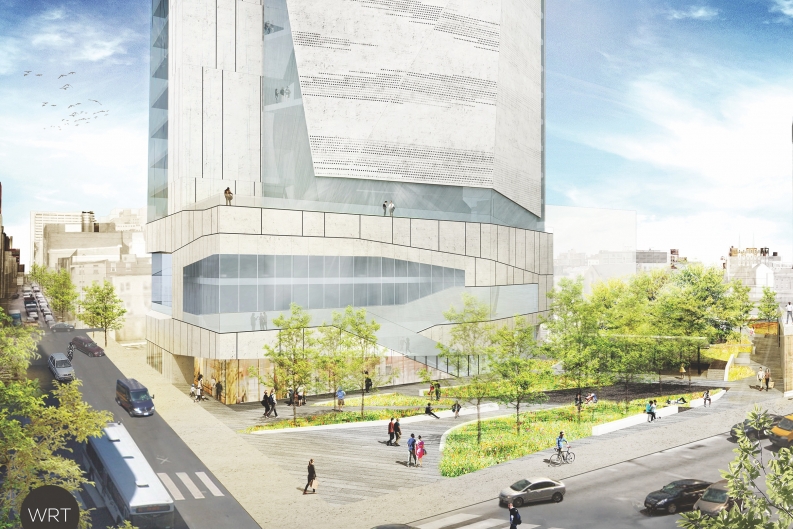The Equal Justice Center: Expanding the Promise of Civil Rights for All
President's Monthly Column - July 2018
By Thomas A. Brophy, president emeritus at Marshall Dennehey Warner Coleman & Goggin, P.C., and president of the Philadelphia Bar Foundation.
Since I last wrote about the Equal Justice Center (EJC), a bold initiative, and another Philadelphia “first” spearheaded by the Philadelphia Bar Foundation, a lot has happened. There have been community events, formal agreements and meetings with member organizations, and floorplans from the building’s architects.
As the project advances, financial support from Philadelphia’s legal, corporate and grant making communities is critical. Construction of the Equal Justice Center will be financed through a combination of private fundraising, public sector grants, low-interest debt, and New Markets Tax Credits. The public funds are contingent upon securing private funds. So, the Bar Foundation is asking the philanthropic community for support to support this project and provide legal and social services to people in need.
The EJC will provide a central beacon of hope for the civil legal needs of Philadelphians who lack the resources to hire private counsel because organizations that provide free or low-cost legal and social services will be together in one building. By providing a permanent, purpose-built location for many of Philadelphia’s civil legal aid nonprofits, the EJC will serve to sustain, strengthen, and increase the impact of civil legal services for all Philadelphians.
Too many of our fellow residents and neighbors—young families, elderly, first-time homeowners, new immigrant families, victims of discrimination and abuse, and youth effected by community violence, among many others—have an array of legal issues and needs for social services but have limited abilities to pay or don’t know where to turn.
The social impact of the EJC will be enormous. It will stand as a symbol of the City’s commitment to the promise of equality under the law, and as an enduring structure that continues to give back to the City and the greater community.
But this isn’t just about improving things for those legal agencies and their clients. It’s about innovating to improve access to justice for all Philadelphians. More than a quarter of Philadelphia’s residents live below the poverty line. And Philadelphia remains the poorest of the nation’s 10 largest cities. For Philadelphians living in poverty, access to affordable or free quality legal and social services is essential.
There is an enduring civil legal justice crisis in Pennsylvania that adversely affects the Courts’ ability to administer justice. This crisis is demonstrated in the ever-increasing number of pro se litigants, a decrease in funding for legal aid, and deeply entrenched chronic poverty challenges. The Philadelphia legal community has asked itself: What innovative and transformative measures can we employ to stretch existing dollars and improve the delivery of civil legal services? A start can be the EJC.
By co-locating Philadelphia’s amazing public interest lawyers, costs and anxieties about long-term accommodations will be reduced. By improving the ability to cooperate and collaborate through shared space and services, awareness of their remarkable work will increase, and they will have the ability to more easily attract funding. By developing new technologies and systems that they design to help to identify and quantify the specific civil legal needs of Philadelphians and provide qualitative solutions to address those needs, the delivery of services to their clients will be improved and access to justice will be more easily attained.
The Equal Justice Center will contribute a significant social impact to our city. Forty thousand individuals and families are served annually by the EJC’s member organizations, and tens of thousands more benefit from impact litigation, advocacy, and policy work. There is a $202 million aggregate social and economic impact from the legal services that will be provided in the building to individual clients, their families, and the broader community.
The EJC concept was developed by the Philadelphia Bar Foundation in conjunction with Regional Housing Legal Services and Pennrose, which is managing the development of a larger development project that spans the 800 block of Vine Street. Award-winning architectural firm WRT is designing the EJC in close consultation with the local community.
Residents and businesses in Philadelphia’s Chinatown neighborhood are involved in a multi-year community engagement process, allowing them to voice their vision for the full development site – which, in addition to the EJC, will include low-income and affordable senior housing, a small hotel, parking, and public space. Our first community meeting took place in Chinatown last fall. The most recent meeting was held on June 20, and additional meetings will occur throughout the planning process.
This dynamic and remarkable project represents a significant long-term investment and commitment by the city’s legal and philanthropic communities to assure that all Philadelphians have access to justice. The Equal Justice Center will transform the capacity and operation of Philadelphia’s legal aid system and we hope you will be a part of it.
The Bar Foundation’s volunteer leadership overseeing the EJC’s creation includes representatives from several dozen regional law firms, corporations, and public and nonprofit law. To learn more about the Equal Justice Center and how to donate visit www.PhilaEqualJusticeCenter.org.

